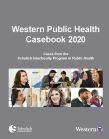Casebook 2020

Download entire book: Western Public Health Casebook 2020
Download by Chapter:
Chapter 1: Public Health in the Midst of a Pandemic
Case 1 : Policy Change and Public Health: Obstacles to Advocating for Public Health Intervention (keywords: Tuberculosis; LTBI; advocacy; context; evidence; framing; models; political climate )
Case 2: The Double Burden of Malnutrition: Challenges and Opportunities in Thailand (keywords: double burden of malnutrition; double-duty actions; life course approach; overnutrition; overweight; stunting: Thailand; undernutrition; wasting; child development)
Case 3 : Coming Together together to Promote Change: Best Practices to Prevent, Treat, and Manage Type 2 Diabetes in Indigenous Type in Indigenous Communities in Canada (keywords: Community-based participatory research; two-eyed seeing ; health disparities; health intervention; Indigenous communities; Indigenous people; social determinants of health; type 2 diabetes)
Case 4: Opioid Crisis in the Windsor-Essex Community: Time for Responsible Opioid Prescribing? (keywords: Best practices; health care providers; opioid crisis; opioid prescription; pain management; patient education)
Case 5: The Precision of Aid: Remembering the Forgotten Disease in the Horn of Africa (keywords: Somaliland; Canadian Red Cross; International Federation of Red Cross and Red Crescent Societies; cholera; epidemiology; precision public health; disease surveillance)
Case 6: No Fixed Address: A Cost-Effectiveness Analysis of a Program to Prevent Psychiatric Discharge to Homelessness (keywords: Cost-effectiveness analysis; homelessness interventions; incremental cost-effectiveness ratio; No Fixed Address (NFA); value for money)
Case 7: Going Beyond Bike Racks and Pedestrian Crossovers: Achieving Health Equity in School Travel Planning (keywords: Active travel; health equity; healthy communities; healthy environments; implementation
science; social determinants of health; socioeconomic status; school travel planning)
Case 8: Is it too Late to Re-evaluate? Creating Client-centered Changes within Canada’s Medical Surveillance System (keywords: Client-centered program evaluation; foreign nationals; medical surveillance; tuberculosis)
Case 9: A Knot of Contradictions: Systems of Intersectionality and Muslim LGBTQ+ Mental Health Programs (keywords: Cultural competency/cultural safety; health inequities; systems; systems of power; Muslim
LGBTQ+ identity; mental health; SGBA+)
Case 10: Changing the Service Delivery Model: How to Make it Happen? (keywords: Active implementation; implementation science; intersectionality; service delivery; systems thinking approach; change; service delivery models)
Case 11: Going Beyond the Virus: Understanding the Drivers of the Ebola Virus Outbreak (keywords: Ebola outbreak; Ebola Virus Disease; global health security; infectious disease governance; international health regulations; outbreak response; Democratic Republic of the Congo; foreign complacency)
Case 12: Prioritizing Emerging and Re-Emerging Non-enteric Zoonotic Infectious Diseases: What Should we be Afraid of Next? (keywords: Climate change; current and emerging public health issues; infectious disease prioritization; measures of occurrence; severity of illness; emerging and re-emerging non-enteric zoonotic
infectious diseases; units of analysis; stakeholder engagement)
Case 13: Preparing for the Tickpocalypse (keywords: Climate change; decision-making; disaster response; emergency management; emergency preparedness; Incident Management System; leadership; risk assessment; risk management; vector-borne disease; stakeholder engagement; Lyme Disease; Ticks)
Case 14: A Sticky Situation: A Medical Problem with a Social Solution (keywords: Risk communication; health and the media; behavioural change; communication campaign; health marketing; risk perception; vaccine hesitancy)
Case 15: Recovery Through Education: An Integrative Approach to Mental Health for the People, by the People (keywords: Cocreation; coproduction; collaboration; lived experience; mental health, mental health recovery; needs assessment; public health leadership; recovery college; social ecological theory; stakeholder engagement)








